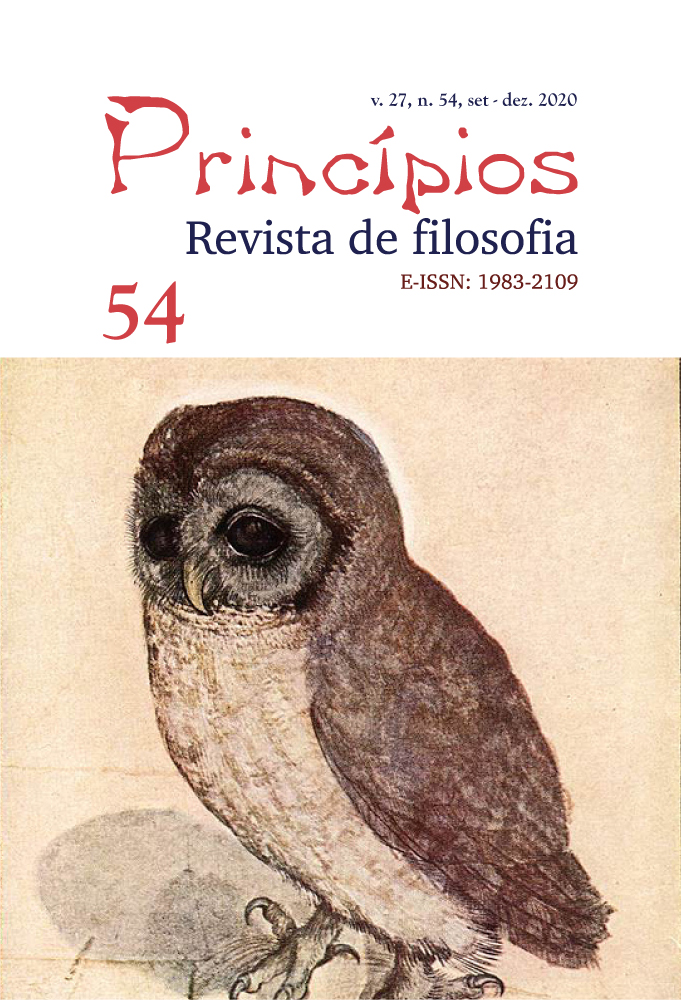Hannah Arendt e a Terra
Uma digressão sobre o Prólogo de A Condição Humana
DOI:
https://doi.org/10.21680/1983-2109.2020v27n54ID19639Keywords:
Arendt, Earth, Heidegger, HusserlAbstract
The Prologue of The Human Condition is an important chapter of the work, and almost no attention has been done to its specificity within the whole of the work, especially the important reference to the concept of Earth, whose appearance in the Prologue is not explained. To this end, we propose to argue in this essay that the concept of Earth as the expression of the human condition set forth in the Prologue “replicates” a discussion by Husserl and Heidegger on the concept of Earth in 1935 in Germany. In order to retrace this parallel, two references will be fundamental: firstly the text by Husserl La terre ne se meut pas; secondly, Heidegger's essay The Origin of the Work of Art. In light of the position of Husserl and Heidegger, Arendt's position constitutes a relevant point of view within the postwar political debate, notably compared to Heidegger's reading of the Earth in the context of contemporary technique.
Downloads
References
ARENDT, H. Crises of the Republic, New York, Penguin Books, 1972.
___________ . A Condição Humana. 12 ed. Rio de Janeiro: Forense Universitária, 2014.
HABERMAS, J. El futuro de la naturaliza humana – Hacia une eugenesia liberal. Barcelona: Editorial Paidós, 2002.
HEIDEGGER, M. Etre e Temps. Paris: Gallimard, 1986.
____________. Questions III e IV. Paris: Gallimard, 1976.
____________. Introduction à métaphysique. Trad. G. Kahn. Paris: Gallimard, 1967.
____________ . L’origine de l’oeuvre d’art, In Chemin que menent nulle part. Paris: Gallimard, 1986.
____________ . Ensaios e Conferências. Rio de Janeiro: Vozes, 2002.
Husserl, E. La terre que ne se meut pas. Paris: Ed. Minuit, 1989.
MARX, K. Le Capital, Livro 1. Paris: PUF, 2000.
Radkowski, Georges-Hubert. Les jeux du désir – De la technique à l’économie, Paris, PUF, 2002.
Taminiaux, Jacques. La fille de thrace et le penseur professionenel. Arendt et Heidegger. Paris: Payot, Critique de la politique, 1992.
________________. Art et événement – espéculation et jugement des Grecs à Heidegger. Paris: Belin, 2005
SCHMITT, C. Der Nomos der Erde, 1950.
_________ . “À partir du ‘nomos’: prendre, pâturer, partager – La question de l’ordre économique et social”, Revue internationale de sociologie, Rome, 1954.
Downloads
Published
How to Cite
Issue
Section
License
Authors retain copyright and grant the journal right of first publication with the work simultaneously licensed under a Creative Commons Attribution License that allows others to share the work with an acknowledgement of the work's authorship and initial publication in this journal.


 Português (Brasil)
Português (Brasil) English
English Español (España)
Español (España) Français (Canada)
Français (Canada)


